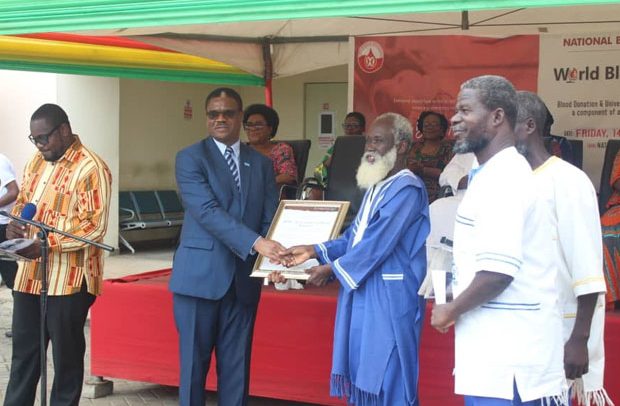Dr. Owen Kaluwa Presenting an award to one of the organizations that have contributed to voluntary blood donation
The World Health Organization (WHO) has added its voice to the call for increased voluntary blood donation in Ghana.
According to the WHO Ghana Representative, Dr. Owen Kaluwa, the demand for blood transfusion was increasing.
However, he said many patients still did not have access to blood and blood components when they needed them.
In 2018, Ghana’s estimated national blood requirement was 280,000 units.
However, the total blood collected nationwide was a little above 169,000 units.
Of this total, about 37 per cent were collected from voluntary, unpaid donors from the three Zonal Blood Centres of the National Blood Service of Accra, Kumasi and Tamale.
The national blood supply system therefore continues to rely heavily on replacement donations by family relations and friends of patients who require blood transfusions.
“WHO is urging countries to support voluntary blood donations as a key component of achieving universal health coverage, and to ensure sustainable funding for national blood transfusion services,” Dr Kaluwa said.
He made the appeal at the commemoration of the 2019 World Blood Donor Day.
This year’s theme “Safe blood for all,” draws attention to the crucial role that voluntary blood donations play in achieving the goal of Universal Health Coverage (UHC).
Dr. Kaluwa said the theme which focuses on blood donation and UHC strongly encourages more people all over the world to become regular voluntary blood donors.
“World Blood Donor Day also serves to raise awareness of the need for regular blood donations to ensure the availability and access to safe, quality assured and affordable blood and blood components for all. Blood transfusion is as an integral part of universal health coverage and a key component of a resilient health system,” he said
He said the African Region has been honoured by the Director General of WHO, Dr. Tedros, who accepted to grant to Rwanda the responsibility to host the 2019 World Blood Donor Day in Africa.
“The hosting of this global event in Rwanda sends a strong message to the world, in particular to countries in our Region, that it is possible for a low-income country to develop an effective and robust blood system when governments demonstrate leadership and commitment to improve blood safety,” he said.
He expressed his appreciation to all voluntary, unpaid blood donors for their life-saving gifts of blood and encourage them to continue this noble gesture on a regular basis to ensure the continued availability and access to safe, quality assured blood and blood components for all patients.
By Jamila Akweley Okerthiri & Sarah Platz


